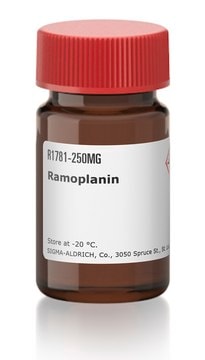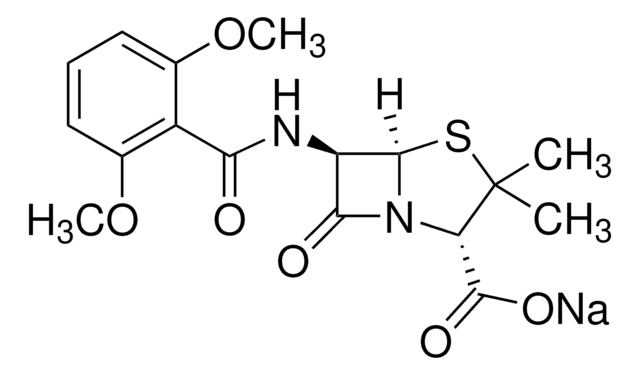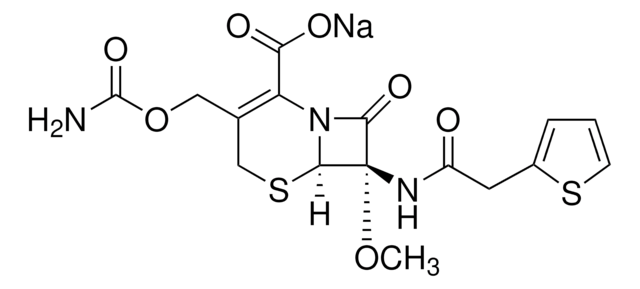V1130
Vancomycin hydrochloride from Streptomyces orientalis
BioReagent, suitable for plant cell culture
About This Item
Recommended Products
biological source
Streptomyces orientalis
product line
BioReagent
form
powder
storage condition
(Keep container tightly closed in a dry and well-ventilated place.)
concentration
≥900 μg/mg (as vancomycin base)
technique(s)
cell culture | plant: suitable
color
, off-white to brown or White to orange-brown
solubility
H2O: 50 mg/mL, clear, colorless to dark yellow (and Very Faint Orange to Faint Orange)
antibiotic activity spectrum
Gram-positive bacteria
application(s)
agriculture
Mode of action
cell wall synthesis | interferes
storage temp.
2-8°C
SMILES string
Cl[H].CO[C@@H]1O[C@H](CO)[C@@H](O)[C@H](O)[C@@H]1O[C@H]2C[C@](C)(N)[C@@H](O)[C@@H](C)O2.CN[C@H](CC(C)C)C(=O)NC3[C@H](O)c4ccc(Oc5cc6Oc7ccc(cc7Cl)[C@@H](O)[C@H]8NC(=O)[C@H](NC(=O)[C@H](NC(=O)[C@H](CC(N)=O)NC3=O)c(c5)c6)c9ccc(O)c(c9)-c%10c(O)cc(O)cc%10[C@@H](NC8=O)C(O)=O)c(Cl)c4
InChI
1S/C66H75Cl2N9O24.ClH/c1-23(2)12-34(71-5)58(88)76-49-51(83)26-7-10-38(32(67)14-26)97-40-16-28-17-41(55(40)101-65-56(54(86)53(85)42(22-78)99-65)100-44-21-66(4,70)57(87)24(3)96-44)98-39-11-8-27(15-33(39)68)52(84)50-63(93)75-48(64(94)95)31-18-29(79)19-37(81)45(31)30-13-25(6-9-36(30)80)46(60(90)77-50)74-61(91)47(28)73-59(89)35(20-43(69)82)72-62(49)92;/h6-11,13-19,23-24,34-35,42,44,46-54,56-57,65,71,78-81,83-87H,12,20-22,70H2,1-5H3,(H2,69,82)(H,72,92)(H,73,89)(H,74,91)(H,75,93)(H,76,88)(H,77,90)(H,94,95);1H/t24-,34+,35-,42+,44-,46+,47+,48-,49+,50-,51+,52+,53+,54-,56+,57+,65-,66-;/m0./s1
InChI key
LCTORFDMHNKUSG-XTTLPDOESA-N
Looking for similar products? Visit Product Comparison Guide
General description
Application
- an antibiotic in screening: minimal inhibitory concentrations (MICs) Streptomyces coelicolor
- in treating Leishmania infected sand flies
- in combined antibiotic treatment in asthma induced mice
Biochem/physiol Actions
Antimicrobial Spectrum: Active against Gram-positive bacteria
Other Notes
Signal Word
Danger
Hazard Statements
Precautionary Statements
Hazard Classifications
Resp. Sens. 1 - Skin Sens. 1
Storage Class Code
11 - Combustible Solids
WGK
WGK 2
Flash Point(F)
Not applicable
Flash Point(C)
Not applicable
Personal Protective Equipment
Certificates of Analysis (COA)
Search for Certificates of Analysis (COA) by entering the products Lot/Batch Number. Lot and Batch Numbers can be found on a product’s label following the words ‘Lot’ or ‘Batch’.
Already Own This Product?
Find documentation for the products that you have recently purchased in the Document Library.
Customers Also Viewed
Articles
β-lactam antibacterials inhibit transpeptidase enzymes, preventing peptidoglycan assembly in both Gram-positive and Gram-negative bacteria.
β-lactam antibacterials inhibit transpeptidase enzymes, preventing peptidoglycan assembly in both Gram-positive and Gram-negative bacteria.
β-lactam antibacterials inhibit transpeptidase enzymes, preventing peptidoglycan assembly in both Gram-positive and Gram-negative bacteria.
β-lactam antibacterials inhibit transpeptidase enzymes, preventing peptidoglycan assembly in both Gram-positive and Gram-negative bacteria.
Our team of scientists has experience in all areas of research including Life Science, Material Science, Chemical Synthesis, Chromatography, Analytical and many others.
Contact Technical Service







